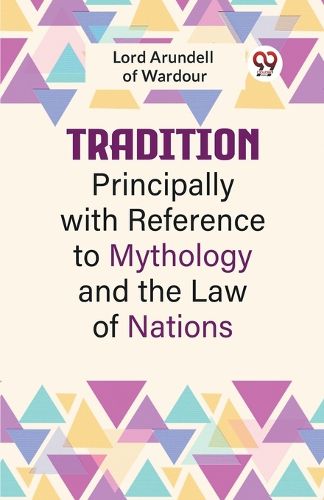Readings Newsletter
Become a Readings Member to make your shopping experience even easier.
Sign in or sign up for free!
You’re not far away from qualifying for FREE standard shipping within Australia
You’ve qualified for FREE standard shipping within Australia
The cart is loading…






This title is printed to order. This book may have been self-published. If so, we cannot guarantee the quality of the content. In the main most books will have gone through the editing process however some may not. We therefore suggest that you be aware of this before ordering this book. If in doubt check either the author or publisher’s details as we are unable to accept any returns unless they are faulty. Please contact us if you have any questions.
"Tradition, principally with Reference to Mythology and the Law of Nations" is an extensive painting via Lord Arundell of Wardour, additionally known as John Francis Arundell, a nineteenth-century British creator and student. The book stands as a pioneering exploration of the connection between way of life, mythology, and the improvement of international law. In this complete paintings, Lord Arundell delves into the profound have an effect on of cultural traditions, myths, and ancient narratives on the evolution of worldwide regulation. He argues that many standards and practices within the realm of global family members have roots in age-vintage myths and traditions. By examining the interconnectedness of human history and criminal norms, Arundell sheds mild on how subculture has played a pivotal function in shaping the world's criminal structures. Arundell's e-book reflects his interdisciplinary method, drawing from mythology, history, and criminal studies to unravel the complex web of connections between tradition and international regulation. He emphasizes how cultural narratives have left an indelible mark on diplomatic relationships, treaties, and the principles that govern interactions between nations. "Tradition, principally with Reference to Mythology and the Law of Nations" stays a great aid for students and readers interested in the historical underpinnings of worldwide regulation and the iconic effect of culture at the improvement of felony and diplomatic norms.
$9.00 standard shipping within Australia
FREE standard shipping within Australia for orders over $100.00
Express & International shipping calculated at checkout
This title is printed to order. This book may have been self-published. If so, we cannot guarantee the quality of the content. In the main most books will have gone through the editing process however some may not. We therefore suggest that you be aware of this before ordering this book. If in doubt check either the author or publisher’s details as we are unable to accept any returns unless they are faulty. Please contact us if you have any questions.
"Tradition, principally with Reference to Mythology and the Law of Nations" is an extensive painting via Lord Arundell of Wardour, additionally known as John Francis Arundell, a nineteenth-century British creator and student. The book stands as a pioneering exploration of the connection between way of life, mythology, and the improvement of international law. In this complete paintings, Lord Arundell delves into the profound have an effect on of cultural traditions, myths, and ancient narratives on the evolution of worldwide regulation. He argues that many standards and practices within the realm of global family members have roots in age-vintage myths and traditions. By examining the interconnectedness of human history and criminal norms, Arundell sheds mild on how subculture has played a pivotal function in shaping the world's criminal structures. Arundell's e-book reflects his interdisciplinary method, drawing from mythology, history, and criminal studies to unravel the complex web of connections between tradition and international regulation. He emphasizes how cultural narratives have left an indelible mark on diplomatic relationships, treaties, and the principles that govern interactions between nations. "Tradition, principally with Reference to Mythology and the Law of Nations" stays a great aid for students and readers interested in the historical underpinnings of worldwide regulation and the iconic effect of culture at the improvement of felony and diplomatic norms.